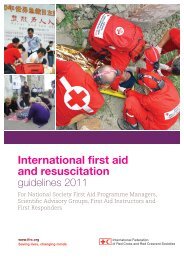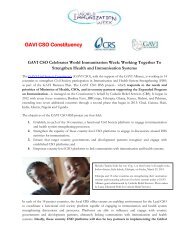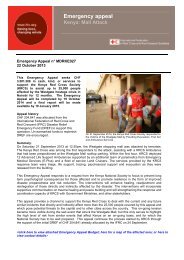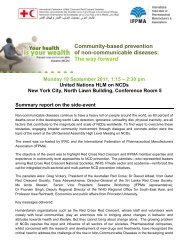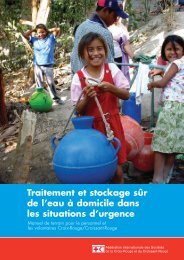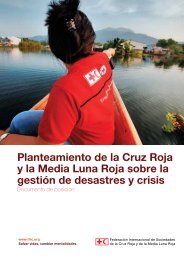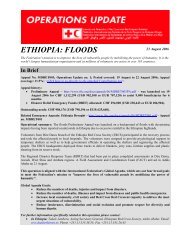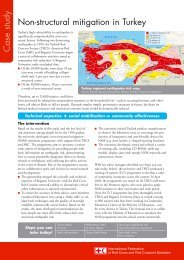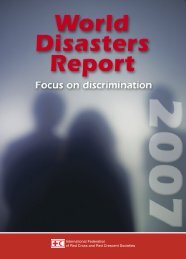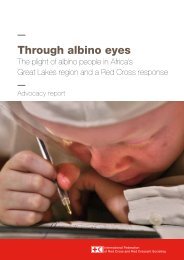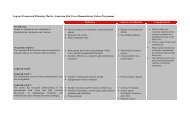World Disasters Report 2010 - International Federation of Red Cross ...
World Disasters Report 2010 - International Federation of Red Cross ...
World Disasters Report 2010 - International Federation of Red Cross ...
You also want an ePaper? Increase the reach of your titles
YUMPU automatically turns print PDFs into web optimized ePapers that Google loves.
Public health <strong>Red</strong>uce impacts <strong>of</strong> extreme heat events �� Improved early warning systems for<br />
extreme heat events<br />
�� Open additional cooling centres during<br />
extreme heat events<br />
�� Increase use <strong>of</strong> shade trees to reduce<br />
urban temperatures<br />
Improve disease surveillance and protection �� Increase monitoring <strong>of</strong> known diseases and<br />
potential diseases moving into the area<br />
�� Increase public education on disease<br />
prevention for vector-borne illnesses that<br />
could increase as a result <strong>of</strong> climate change<br />
Energy Ensure consistency <strong>of</strong> energy supplies while<br />
expanding to low-income groups<br />
130<br />
<strong>Red</strong>uce greenhouse gas emissions associated<br />
with energy use<br />
Transportation Ensure that transportation network functions<br />
despite changes in temperature and<br />
precipitation<br />
Ensure that transportation system facilitates<br />
rapid emergency responses<br />
Financing urban adaptation<br />
�� Strengthening <strong>of</strong> overhead transmission<br />
and distribution infrastructure<br />
�� Underground cabling for utilities<br />
�� <strong>Red</strong>uced dependence on single sources <strong>of</strong><br />
energy<br />
�� Energy efficiency<br />
�� Use <strong>of</strong> renewable sources<br />
�� Realignment or relocation <strong>of</strong> transport<br />
infrastructure<br />
�� Improved design standards and planning<br />
for roads, rail and other infrastructure<br />
�� Effective emergency plans for utilizing<br />
transportation networks for evacuations, etc.<br />
Source: Adapted from ICLEI (2007) and IPCC (2007)<br />
Meeting the challenges <strong>of</strong> climate change will require considerable investment in infrastructure<br />
and services – particularly in low- and middle-income nations. However,<br />
many <strong>of</strong> the existing assessments <strong>of</strong> adaptation costs have been based on present investment<br />
in infrastructure and have not taken into account the infrastructure deficit (the<br />
current shortfall in infrastructure provision for cities under existing climatic conditions)<br />
present in many cities in low- and middle-income nations. Any realistic measure<br />
<strong>of</strong> the costs <strong>of</strong> adaptation in urban areas therefore needs to be informed by an analysis<br />
<strong>of</strong> current disaster risks and the required investment in housing, early warning systems<br />
and rapid and effective post-event responses including temporary accommodation,<br />
restoring access to services, supporting rapid return to damaged settlements and supporting<br />
rebuilding.<br />
However, new funding pathways are currently being developed that are intended to<br />
support investment in adaptation to climate change. Some <strong>of</strong> these fall under the<br />
banner <strong>of</strong> traditional overseas development assistance. Others are coordinated under<br />
the UNFCCC, although their precise nature is the focus <strong>of</strong> ongoing UNFCCC



